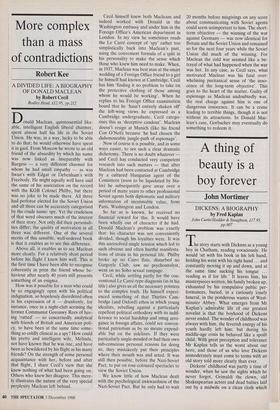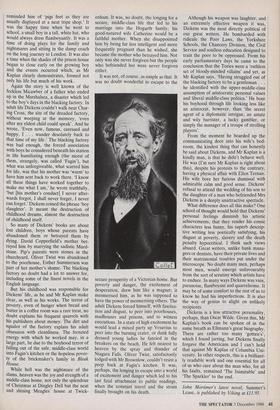A thing of beauty is a boy forever
John Mortimer
DICKENS: A BIOGRAPHY by Fred Kaplan
John Curtis/Hodder & Stoughton, £17.95, pp.607
he story starts with Dickens as a young boy in Chatham, reading voraciously. He would 'sit with his book in his left hand, holding his wrist with his right hand ... and constantly moving it up and down, and at the same time sucking his tongue ... reading as if for life.' It leaves him, his masterpieces written, his family broken up, exhausted by his compulsive public per- formances, buried, in a curiously lonely funeral, in the ponderous wastes of West- minster Abbey. What emerges from Mr Kaplan's admirable life of our greatest novelist is that the boyhood of Dickens never ended. The wonder of childhood was always with him, the feverish energy of his youth hardly left him; but during his middle-age crisis he behaved like a spoilt child. With great perception and tolerance Mr Kaplan tells us the worst about our hero, and those of us who love Dickens immoderately must come to terms with an old story told more clearly than ever.
Dickens' childhood was partly a time of wonder, when he saw the sights which he never forgot, Grimaldi the clown, old Shakespearian actors and dead babies laid out by a midwife on a clean cloth which reminded him of 'pigs feet as they are usually displayed at a neat tripe shop.' It was the happy time when he went to school, a small boy in a tall, white hat, who would always dress flamboyantly. It was a time of doing plays for the family and nightmares and sitting in the damp coach on the long journey to London. It was also a time when the shades of the prison house began to close early on the growing boy and the events occurred which, as Mr Kaplan clearly demonstrates, formed not only his life but much of his work.
Again the story is well known of the feckless Micawber of a father who ended up in the Marshalsea, a disaster which led to the boy's days in the blacking factory. In adult life Dickens couldn't walk near Char- ing Cross, the site of the dreaded factory, without weeping at the memory, 'even after my eldest child could speak'. And he wrote, 'Even now, famous, caressed and happy, I . . . wander desolately back to that time of my life.' The blacking factory was bad enough, the forced association with boys he considered beneath his station in life humiliating enough (the nicest of them, strangely, was called 'Fagin'), but what was unforgiveable, what scarred him for life, was that his mother was 'warm' to have him sent back to work there. 'I know all these things have worked together to make me what I am,' he wrote truthfully, 'but [his mother's conduct] I never after- wards forgot, I shall never forget, I never can forget.' Dickens coined the phrase 'boy slaughter'. It meant the destruction of childhood dreams, almost the destruction of childhood itself.
• So many of Dickens' books are about lost children, boys whose parents have abandoned them or betrayed them by dying. David Copperfield's mother bet- rayed him by marrying the sadistic Murd- stone. Pip's parents were stones in the churchyard, Oliver Twist was abandoned to the poorhouse, Esther Summerson was part of her mother's shame. The blacking factory no doubt had a lot to answer for, including some of the finest novels in the English language.
But his childhood was responsible for Dickens' life, as he and Mr Kaplan make clear, as well as his works. The terror of poverty, even of hunger when bread and butter in a coffee room was a rare treat, no doubt explains his frequent quarrels with his publishers about money. The dirt and Squalor of the factory explain his adult obsession with cleanliness. The frenzied energy with which he worked may, in a large part, be due to the boyhood terror of falling out of the safe, middle-class world into Fagin's kitchen or the hopeless pover- ty of the brickmaker's family in Bleak House.
While hell was the nightmare of the slums, heaven was the joy and strength of a middle-class home, not only the splendour of Christmas at Dingley Dell but the neat and shining Meagles' house at Twick- enham. It was, no doubt, the longing for a secure, middle-class life that led to his marriage into the Hogarth family; his good-natured wife Catherine would be a faithful mother. When she disappointed him by being far less intelligent and more frequently pregnant than he wished, she became the mother who betrayed him. Not only was she never forgiven but the people who befriended her were never forgiven either.
It was not, of course, as simple as that. It was no doubt wonderful to escape to the secure prosperity of a Victorian home. But poverty and danger, the excitement of desperation, drew him like a magnet; it mesmerised him, as he was supposed to have the power of mesmerising others. The adult Dickens forced himself, with fascina- tion and disgust, to peer into poorhouses, madhouses and prisons, and to witness executions. In a state of high excitement he would lead a mixed party up Vesuvius to peer into the burning crater, or dunk fully dressed young ladies he fancied in the breakers on the beach. He felt nearest to heaven by the spray and thunder of Niagara Falls. Oliver Twist, satisfactorily lodged with Mr Brownlow, couldn't resist a peep back at Fagin's kitchen. It was, perhaps, the longing to escape into a world of excitement and danger which led to his last fatal attachment to public readings, when the constant travel and the strain finally brought on his death. Although his weapon was laughter, and an extremely effective weapon it was, Dickens was the most directly political of our great writers. He bombarded with ridicule the Poor Laws, the Yorkshire Schools, the Chancery Division, the Civil Service and soulless education designed to train the poor to be oppressed. From his early parliamentary days he came to the conclusion that the Tories were a 'ruthless set of bloody-minded villains' and yet, as Mr Kaplan says, 'Having struggled out of the blacking factory to be a gentleman. . . he identified with the upper-middle-class assumption of aristocratic personal values and liberal middle-class politics.' He bore his boyhood through life looking less like an aristocrat, however, than 'the secret agent of a diplomatic intrigue, an astute and wily barrister, a lucky gambler, or simply the manager of a troupe of strolling players'.
From the moment he boarded up the communicating door into his wife's bed- room, the kindest thing that can honestly be said about Dickens, and Mr Kaplan is a kindly man, is that he didn't behave well. He was (I'm sure Mr Kaplan is right about this), despite his protests to the contrary, having a physical affair with Ellen Ternan. His wife bore her furious dismissal with admirable calm and good sense. Dickens' refusal to attend the wedding of his son to the daughter of a man who befriended Mrs Dickens is a deeply unattractive spectacle.
What difference does all this make? One school of thought would hold that Dickens' personal feelings diminish his artistic achievements; that they render his comic characters less funny, his superb descrip- tive writing less poetically satisfying, his disgust at poverty, slavery and the death penalty hypocritical. I think such views absurd. Great writers, unlike bank mana- gers or dentists, have their private lives and their matrimonial troubles put under the microscope. No doubt many men, perhaps most men, would emerge unfavourably from the sort of scrutiny which artists have to endure. In many ways Dickens was vain, paranoiac, flamboyant and quarrelsome. It may be of some comfort to the rest of us to know he had his imperfections. It is also the way of genius to alight on unlikely recipients.
Dickens is a less attractive personality, perhaps, than Oscar Wilde. Given this, Mr Kaplan's book can be spoken of in the same breath as Ellmann's great biography. There are rather too many 'gotten's', which I found jarring, but Dickens finally forgave the Americans and I can't hold that against Mr Kaplan of Columbia Uni- versity. In other respects, this is a brilliant- ly readable work and one essential for all of us who care about the man who, for all his faults, remained 'The Inimitable' and 'The Sparkler' to the end.
John Mortimer's latest novel, Summer's Lease, is published by Viking at .£11.95.



































































 Previous page
Previous page